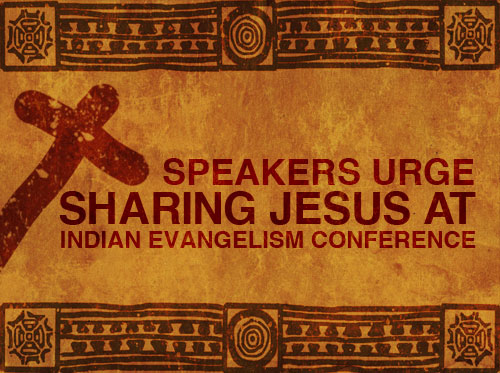There is a church because there is a mission, not vice versa, Milfred Minatrea told those attending the annual Indian Evangelism Conference at Oklahoma City, Glorieta March 1-3.
Minatrea, executive director of the Missional Church Center in Dallas, was one of five speakers who urged the Native Americans to reach out to their neighbors with the Gospel.
Minatrea said the problem with many churches today is that they are in a maintenance mode. He calls this the Hagar Syndrome.
“When Hagar left the home of Abraham, she met the Lord of Angels, who asked her two questions: ‘Where did you come from and where are you going?” Minatrea noted. “She answered only the first question. And likewise, many churches know where they came from, but have no clear vision of where they are going.”
He listed traits of a maintenance church as generally in decline, evangelism a low priority in practice, program oriented, reactive vs. proactive, resistant to change, inward focused, an overwhelming tyranny of tradition with lots of monuments, memorials and sacred cows.
Congregations get in this mode for several reasons, he said. Among them are the evolution of the life cycle of the congregation, it has reached anticipated optimum, the leadership capacity is maximized or community transformation has occurred without the congregational change reflecting demographic shifts.
Minatrea said churches in this mode have three choices: It can continue to do things it has always done; it can do the same things better, or it can begin doing a new thing.
He said churches need to clarify why they exist and abandon things that aren’t helping reach their purpose.
“It only takes 2 percent of the people to have a new vision,” he indicated. “Don’t despise what God can do with a small thing.”
Minatrea added that the community should be better because the church is there.
“We bear responsibility for the people around our church,” he said. “You will find there are people around your church who are unlike you. They don’t have to become like you. They just have to know your Jesus.”
He acknowledged that ministry is compassion that moves beyond pity to pay the price to invest in another’s life.
“We are only gathered together a few hours a week,” he observed. “So the majority of our ministry takes place outside the church doors. You are the backbone of Oklahoma, yet this state is not saved. The hope of the world is present in you.”
Minatrea pointed out that evangelism is not hard.
“Your neighbors and family members just want someone to listen,” he noted. “Listen, then let the Word of God come out of you. You are already the messengers of God. It is wrong if we pray for the missionary on the other side of the world and fail to pray for the neighbor next door.”
Ledtkey McIntosh, pastor of Okemah, First, said he hung his soul on Romans 10:13 many years ago, but he is concerned people aren’t sharing that Good News today with people who have never heard it.
“Only one out of four people believe it is their responsibility to share the Gospel,” Ledtkey revealed. “And 95 percent of church members have never won anyone to the Lord.”
Ledtkey said he has a theory why.
“We have church houses full of people who are lost,” he declared. “Thousands are on church rolls who live like the devil, but say they are saved. And they are offended if you suggest they may be lost.
“How can people claim they are disciples of Jesus Christ if they don’t lead other people to Him?”
Rendon Falls, pastor of Shawnee, Karis and son of Glorieta pastor Emerson Falls, said we wake up every day so we can tell someone about Jesus.
“You influence decisions people make about Jesus,” he emphasized. “If they see Jesus in you, walls are going to be broken down. But you can also have a terrible negative influence causing people to turn away from Jesus.”
Falls said he spent the last year preaching through the book of Ephesians, and he learned three things: 1. I am a sinner saved by grace. 2. I am saved so I might do good works for the Kingdom of God. 3. We are to be ambassadors of the Lord Jesus Christ in everything we do and everything we say.
“What we do will help people find Jesus or shut the door on them finding Him,” he observed. “If the enemy can pull you away even for a short time, and get you to act like the rest of the world, you’ll have a negative influence and help someone shut the door to eternity with Jesus. That is against what we are all about.”
On Saturday morning, evangelism awards were presented to the top 10 Native American churches in baptisms. Jesus Pacheco, BGCO ethnic evangelism strategist, announced that Native American churches baptized 437 people in 2011, up 9 percent from the year before. Leading the churches in numbers was Sasakwa, Spring, followed by Muskogee, First Indian; Big Arbor Indian; Oklahoma City, Central; Oklahoma City, Westlawn; Oklahoma City, Glorieta; Stilwell, Fairfield; Locust Grove, Country; Oklahoma City, Victory; McLoud, Emmaus; Pawhuska, Osage Indian and Red Rock, Otoe.
Emerson Falls and his wife, Shirley, were recognized for their contributions to Native American work. Falls is past president of the Baptist General Convention of Oklahoma and director of the Indian Evangelism Conference.






